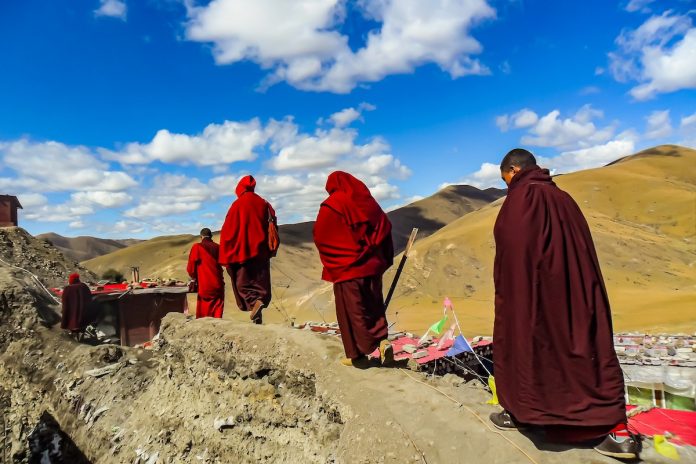Chinese authorities have been called out by a rights group over the death of a 19-year-old Tibetan monk recently released from police custody.
Human Rights Watch said that the now deceased monk, Tenzin Nyima was from Dza Wonpo monastery, in Wonpo township, Kandze (Ch: Ganzi) prefecture, a Tibetan area within China’s southwest Sichuan province.
The rights group said that the authorities initially detained him on Nov. 9, 2019, two days after he and three other Wonpo monks briefly distributed leaflets and shouted slogans calling for Tibetan independence outside the local Wonpo government office. The protests occurred as local officials increasingly put pressure on forcibly resettled nomads and local residents to publicly praise the government’s “Poverty Alleviation” program.
Authorities also detained six other young Tibetans — including a 16-year-old boy — and then sentenced them to up to five years in prison for involvement in the same peaceful protests.
The authorities released Tenzin Nyima in May 2020, but rearrested him on Aug. 11, apparently for sharing news of the arrests online, including with contacts in India, HRW said.
In early October, prison authorities told his family to collect him from the prison due to his medical condition. Tibetans in exile with knowledge of the case said he was unable to speak or move and was suffering from serious injuries and an acute respiratory infection, which they believed was due to beatings, malnourishment, and mistreatment in custody.
On Oct. 9, Tenzin Nyima he was admitted to a hospital in the provincial capital, Chengdu, by which time he had lost consciousness. A hospital report that HRW obtained indicates that he had been in critical condition for 10 days before being handed over to his family. After he spent several weeks in the hospital, doctors declared his injuries to be beyond treatment and discharged him.
On Dec. 1, his family succeeded in having him admitted, still comatose, to a hospital in Kandze prefecture, Dartsedo (Ch: Kangding). Doctors at that hospital also discharged him on the grounds that his condition is terminal. Further evidence seen by HRW indicated that he was paralyzed and gravely ill. He died soon after relatives brought him home.
“Chinese authorities have once again turned arbitrary detention into a death sentence,” said Sophie Richardson, HRW’s China director.
The rights group said that Chinese police and prison authorities routinely torture and abuse inmates, and the situation is particularly severe in ethnic minority regions.
“Urgent, grim cases like the imprisonment of the young Tibetans have prompted UN experts to call for a mechanism to monitor and report on grave abuses by Chinese authorities,” Richardson said. “A failure to hold accountable those responsible for Tenzin Nyima’s death enables further appalling violations.”
Protests in Wonpo
Informants in exile with knowledge of developments in the Wonpo area said that the November 2019 protests took place against a background of heightened discontent after local officials placed increasing demands on resettled herders and other residents. The officials had required the former herders to publicly praise the Chinese government’s “Poverty Alleviation” policies, which are being carried out throughout China and which in Tibet generally include the compulsory resettlement of nomads and other rural dwellers.
Officials had reportedly ordered former herders and other poor families in Wonpo, which has approximately 2,000 households, to declare on camera or to visiting officials that their lives had improved as a result of the anti-poverty drive.
“Poor families are made to borrow other peoples’ cattle and furniture and so on in order to put on a show of having been made richer,” the source said, and local officials “threatened many poor households that if they didn’t have those things, then they should borrow them from others and put on a show, or else later they would be detained and punished.”
The source said that local officials in Wonpo “were planning another such show just before Nov. 7 [2019] and … this made people angry. There was a lot of opinion and writing about it and it was at that time that this protest took place.”
Radio Free Asia reported that during the first Wonpo protest in November 2019, “the nomads’ livelihoods have gone from bad to worse [following resettlement], and, not having any other sources of income, they have to depend solely on government subsidies for their survival.” The report quoted a local source as saying at the time, “during tours to the area by Chinese officials, the resettled nomads are forced to put up pictures of Chinese national leaders and praise China’s ruling Communist Party in public speeches, which are then filmed and distributed to Chinese mass media.”
During a wave of protests by Tibetans against Chinese rule in 2008, monks at Wonpo monastery refused to hoist Chinese national flags on the monastery’s roofs. An ensuing crackdown led to searches of Tibetan homes and scores of detentions, with at least three monks given prison sentences, according to foreign media reports.
Armed police were deployed in the local community, which was singled out for surveillance and restrictions by the authorities, leading to further protests and arrests in 2012. Two other Wonpo monks, Lobsang Lhundrub and Choechok, were detained in December 2017 and March 2018 respectively; Choechok was released two years later.









